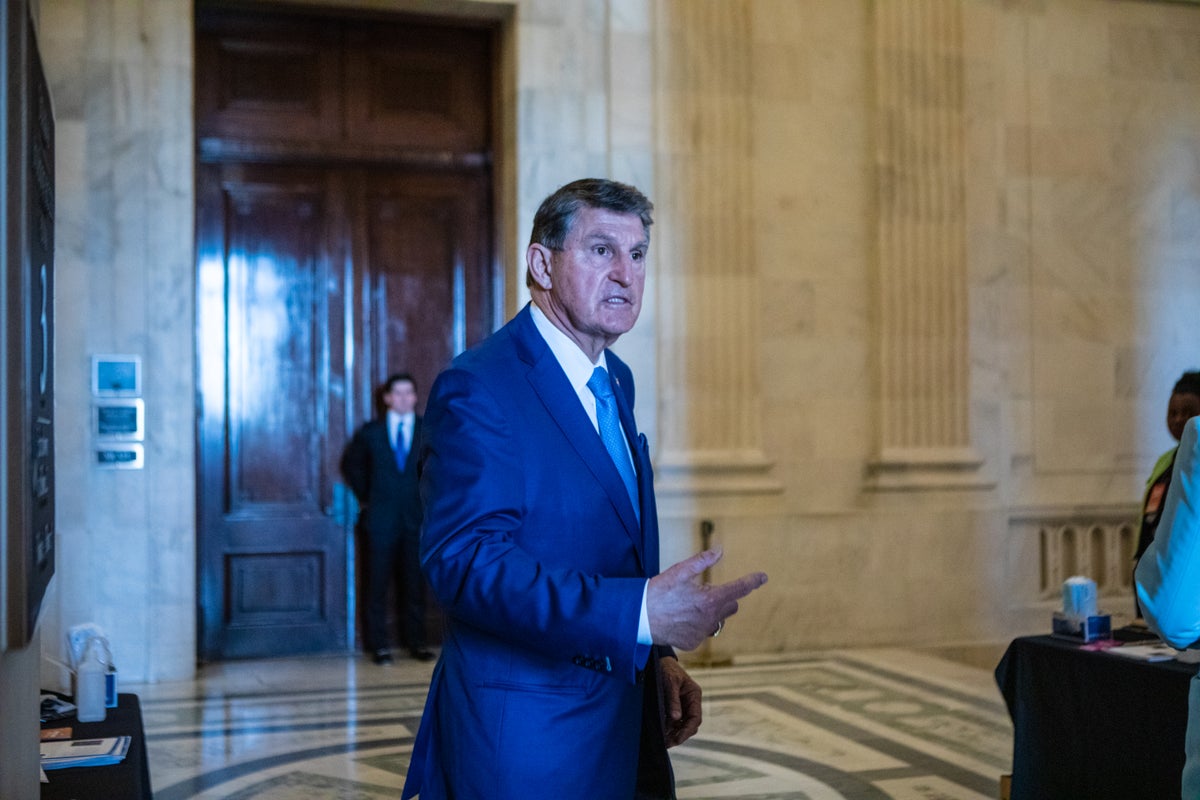
Sen Joe Manchin, the conservative Democratic Senator from the arch-Republican state of West Virginia whose aversion to more liberal policies often dictated the course of President Joe Biden’s domestic policy agenda, announced on Thursday that he would not run for re-election.
In a video announcement, Mr Manchin said he would neither run for re-election in West Virginia, a formerly Democratic state that began voting for Republicans because of its heavy reliance on the coal mining industry.
“After months of deliberation and long conversations with my family, I believe in my heart of hearts that I have accomplished what I set out to do for West Virginia,” he said while speaking at his desk. “I have made one of the toughest decisions of my life and decided that I will not be running for re-election to the United States Senate, but what I will be doing is traveling the country and speaking out to see if there is an interest in creating a movement to mobilize the middle and bring Americans together.”
The words seemed to allude to the fact he has considered a presidential run on a No Labels ticket, something that Democrats worry would hand the 2024 presidential election to Donald Trump, who won every county in West Virginia both times.
Mr Manchin, who won two terms as governor of West Virginia, frequently won his races for governor and Senate even as Democratic nominees for president would lose West Virginia.
At the same time, he regularly clashed with members of his own party, particularly when it came to environmental and energy policy. As the chairman of the Senate Energy and Natural Resources Committee, Mr Manchin held significant sway over Democratic policy when Mr Biden became president, often opposing attempts to weaken the coal industry.
Some Democrats and environmental activists criticised his approach, citing the fact he led the company Enersystems, a coal brokerage firm run by his son Joe Manchin IV, and said he had a conflict of interest.
As a Democrat representing a state where every county voted for Mr Trump, he frequently voted for Republicans, voting to confirm many of Mr Trump’s cabinet nominees and for two of his Supreme Court nominees, including Justices Neil Gorsuch and Brett Kavanaugh. At the same time, Mr Manchin voted for both of Mr Trump’s nominations.
When Democrats took control of the White House and gained a 50-50 majority in the Senate after winning two runoff races in Georgia, Mr Manchin gained immense power. Together with Arizona Sen Kyrsten Sinema, who later left the Democratic caucus to become an independent, the two often wielded immense power to pare down domestic policies priorities of Mr Biden and Democrats.
Mr Manchin’s opposition to efforts to promote green energy at the expense of fossil fuels, as well as his opposition to new government spending programs, led to him ultimately killing Build Back Better, Mr Biden’s proposed social spending bill.
Similarly, he opposed efforts from other Democrats to remove the filibuster to protect voting rights, joining Ms Sinema. An ardent Catholic and descendent of Italian immigrants, Mr Manchin also opposed Democrats’ efforts to codify the protections in Roe v Wade after the Dobbs v Jackson decision leaked.
Ultimately, he and Senate Majority Leader Chuck Schumer negotiated to pass the Inflation Reduction Act, which invested heavily in renewable energy, allowed for Medicare to negotiate drug prices and capped the price of insulin to $35.
The bill passed on party lines and Mr Biden later praised Mr Manchin. But the West Virginia Democrat would later lament the way that the Biden administration implemented the law.
For years, Mr Manchin would find a way to appeal to voters who continued to drift away from the Democratic Party, creating an aggressively local brand of politics.
When he first ran for Senate in 2010 for the late Sen Robert Byrd’s seat, he notably shot Democrats proposed “cap and trade bill” with a rifle. After his victory, he chose not to have a permanent home in Washington, but rather living on a houseboat named Almost Heaven, a line from the John Denver song “Country Roads,” the state’s song.
He would often make major announcements when speaking to the West Virginia MetroNews radio station, specifically with host Hoppy Kercheval, where he would often explain his decisions in Washington to his constituents. He frequently touted his ability to work with Republicans. In 2012, after the Sandy Hook Elementary School massacre, he worked with a Republican senator to forge a bipartisan compromise to curb gun violence that ultimately failed in the Senate.
Mr Manchin also became a key negotiator on everything from providing Covid-19 relief to the bipartisan infrastructure bill along with Ms Sinema.
But his crossover appeal began to severely diminish. In 2018, he narrowly won re-election against Attorney General Patrick Morrisey, one of his slimmest margins of victory. Late last month, a Morning Consult poll showed that he was the most unpopular Senator in the country.
Polling showed that he would likely lose to Gov Jim Justice, his former friend whom he had convinced to become a Democrat and run for governor in 2016. But their relationship became strained after Mr Trump convinced Mr Justice to become a Republican.
Mr Manchin seemed unsure about what his next move would be in a career that spanned more than 40 years, but seemed to have fewer avenues.
On Thursday, The Independent asked him if the re-election of Gov Andy Beshear, a Democrat, in a Republican state like Kentucky, he responded negatively.
“Nothing impacts my decision,” he told The Independent as he exited the Senate after a vote with a smile on his face. “Except my family.”







